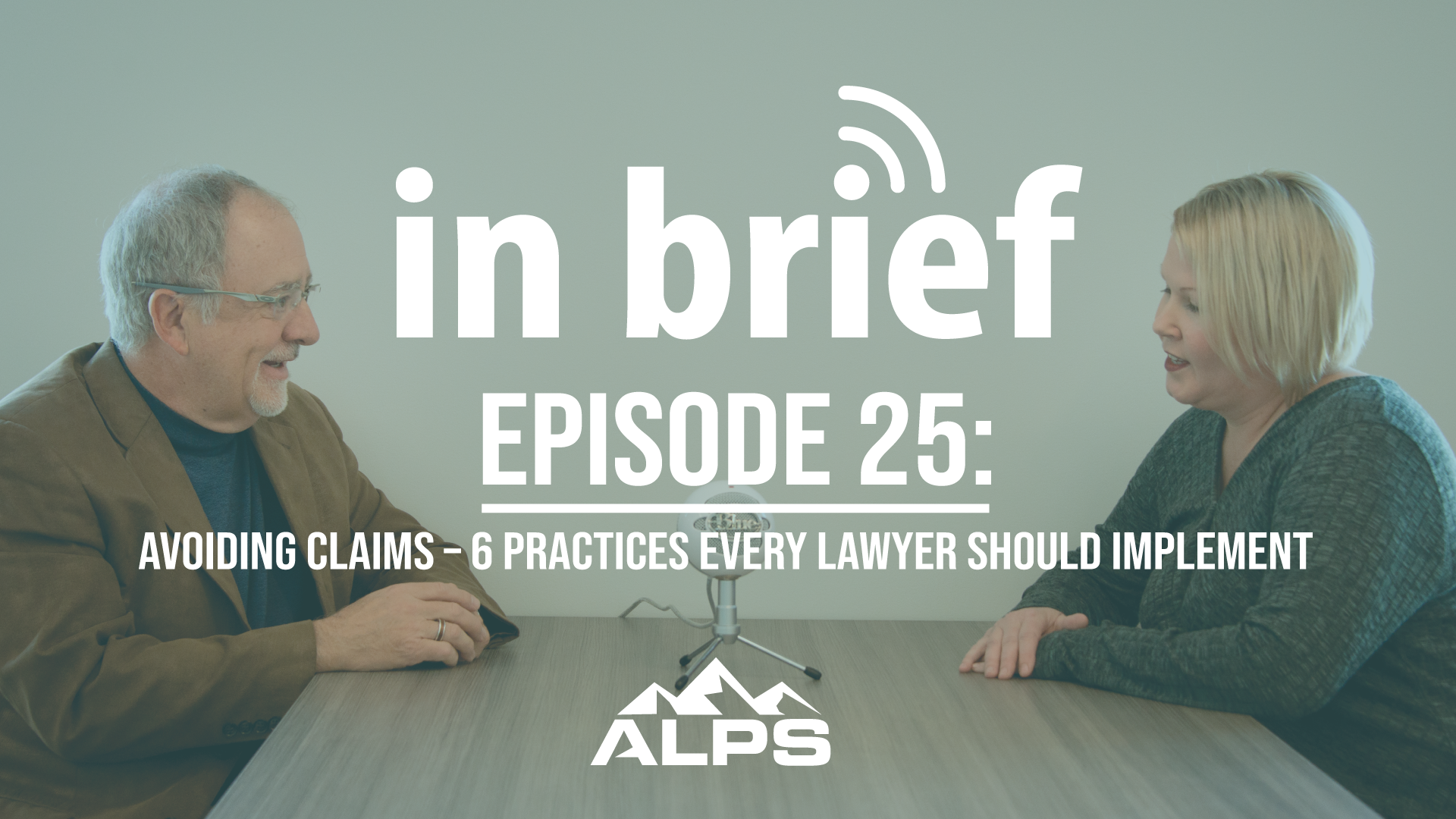4 min read
Is It Okay For a Lawyer to Text with Clients?
Is it okay for a lawyer to text with clients? This question is one that keeps coming up. The short answer is yes; but just because you can do...
We've crafted solutions tailored to your firm
The world of insurance for law firms can be confusing, and difficult to navigate. We've created this glossary because these common insurance terms should be easy to understand.
3 min read
 Mark Bassingthwaighte, Risk Manager
:
Updated on November 15, 2023 | Posted on January 19, 2022
Mark Bassingthwaighte, Risk Manager
:
Updated on November 15, 2023 | Posted on January 19, 2022

I love a good story, particularly when a valuable lesson can be learned from its telling. Here are two memorable ones.
A long-term client reached out to his attorney with a quick question about an airplane he owned. The plane had been under renovation, which included a substantial upgrade, for some time. Due to time delays and cost overruns, a significant fee dispute had come into play. Figuring that possession of the plane would strengthen his position in the fee dispute, the client reached out to his attorney to ask if he could remove his property from the repair facility. For reasons unknown, the attorney failed to . Instead, he made the decision to quickly share a technically correct answer. His reply was along the lines of “yes, recovery of property you already own is not illegal. You have a right to its possession” and he left it at that. The client shortly thereafter successfully recovered the property and was subsequently arrested due to the manner in which the recovery was carried out. Eventually the client incurred a substantial loss as a result of a civil suit brought by the repair facility. Of course, this client then sought recovery from the attorney alleging negligent advice. The attorney tried to defend his actions by essentially saying “Not only did I never tell him to go and take possession of the plane, I had no idea he would try something like that! This one’s not on me.” Suffice it to say, that defense didn’t fly. Pun intended.
My next story involves an attorney who was representing the executor of an estate. This attorney would later describe the situation as his having little involvement because the client was really running the show. All the client wanted was a little advice and direction from time to time. At one point, this client reached out to share that she disagreed with a conclusion the Commissioner of Accounts had reached regarding the calculation as to how certain funds should be distributed. The attorney casually shared that he too disagreed with the Commissioner’s conclusion and also let the client know that if an issue were to ever arise, he would speak with the Commissioner in order to clear up the confusion. Unfortunately, this client took that response as an implicit okay to go ahead and she disbursed the funds in accordance with her interpretation of the will. Needless to say, the Commissioner did not approve the accounting and now there was a problem.
Here are the takeaways.
I get that at times it can be tempting to take the easy way out when a client asks a question. If nothing else, quickly spouting off some generic or technically correct advice or sharing an off-the-cuff comment can certainly save some time. Regardless of your reasoning, a decision to take the easy way out is never a good idea. That’s one takeaway.
It also matters not if the reason you decide to take an easy way out is that you truly believe you don’t have the time, view the question as unimportant, are talking with a non-client, are talking in a casual setting, or are just saying what you think your client wants to hear so you can move on. These are all rationalizations; and when rationalizations are used to justify a decision to take an easy way out, trouble may be just around the corner. Such advice, which really is the equivalent of giving advice in a vacuum, is problematic because you are failing to consider how the person you are speaking with might rely upon or act on the advice. This too is a takeaway.
Giving advice in a vacuum is rarely appropriate, particularly in the absence of adequate and documented disclaimers. Even if technically allowable under some defined set of circumstances, doing so fails to take into account the realities of the attorney-client relationship. Clients do expect their attorney to stand by any and all advice given, and the client will consider an attorney’s attempt to claim an intentional limited knowledge of the circumstances as irrelevant. The client will still seek to hold their attorney accountable for any unanticipated fallout that occurs once the client acts on the advice received. Again, a takeaway.
But wait, there’s more.
There is also an ethical component to this. Consider ABA Model Rule 1.4 Communications, which states in section (b), “A lawyer shall explain a matter to the extent reasonably necessary to permit the client to make informed decisions regarding the representation.” This makes it quite clear. At a minimum, the attorneys in the two stories above should have taken the conversations further by inquiring about their client’s proposed course of action. By not doing so, these two attorneys allowed their clients to act without the benefit of legal advice given with full awareness of the entire situation. Had these two attorneys made an effort to take into account what their clients were thinking, the advice would have been, out of necessity, quite different.
In the end, a defense along the lines of “I had no idea my client was going to do that” is no defense at all, even with perceived short unimportant calls where one is tempted to not take the time to ask the right questions. When situations like the above arise, there is no middle ground. There really are just two options. One is to decline to provide any advice and the other is to take the time to give a competent, thorough, and reasoned response based upon full awareness of the client’s situation. Come at it from a different perspective by trying to put yourself in your client’s shoes. Would you expect anything less when asking an attorney your own question? Call me a skeptic if you must; but I seriously doubt it.
Since 1998, Mark Bassingthwaighte, Esq. has been a Risk Manager with ALPS, an attorney’s professional liability insurance carrier. In his tenure with the company, Mr. Bassingthwaighte has conducted over 1200 law firm risk management assessment visits, presented over 600 continuing legal education seminars throughout the United States, and written extensively on risk management, ethics, and technology. Mr. Bassingthwaighte is a member of the State Bar of Montana as well as the American Bar Association where he currently sits on the ABA Center for Professional Responsibility’s Conference Planning Committee. He received his J.D. from Drake University Law School.

4 min read
Is it okay for a lawyer to text with clients? This question is one that keeps coming up. The short answer is yes; but just because you can do...

4 min read
In this episode of ALPS In Brief, ALPS Risk Manager Mark Bassingthwaighte shares an insightful story of a dream cruise, a freak accident, and an...

11 min read
In this episode of the ALPS in Brief podcast, ALPS claims attorney Kobi Gibbs sits down with ALPS Risk Manager Mark Bassingthwaighte to offer...